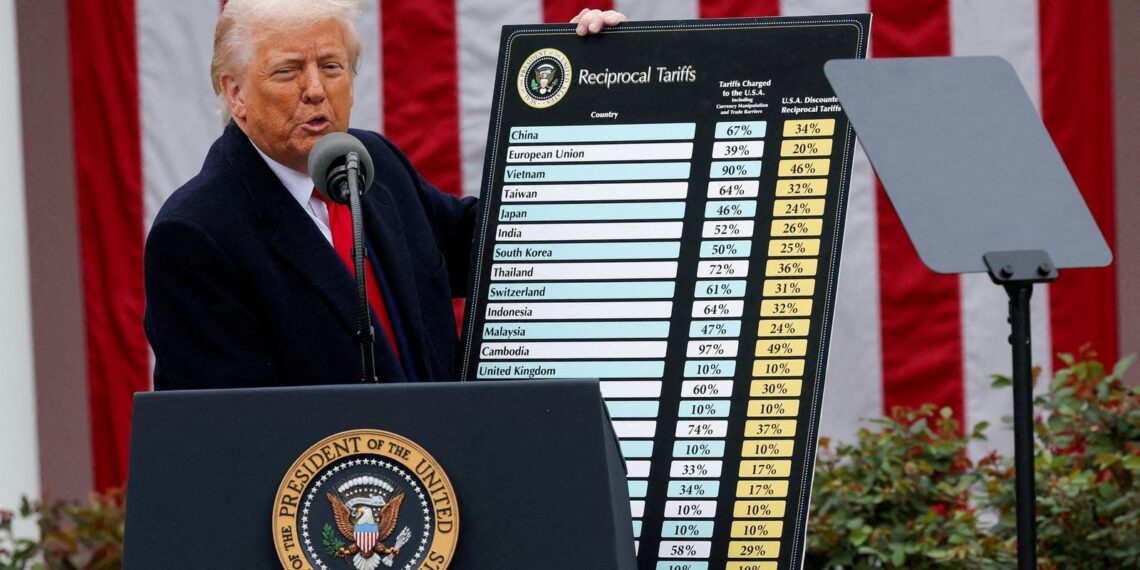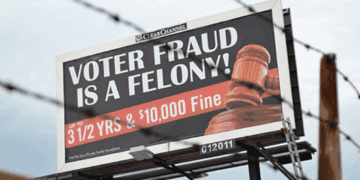By John F. Di Leo, Opinion Contributor
Very few people know how to cover the economic news this year. President Trump and his team are taking an approach to global economics that nobody has ever really tried before.
Now, that’s not saying there have never been tariffs; of course there have. But in this second term, we are seeing several things at play that are truly brand new, and that changes the situation for all of us, including those of us who write about these matters. We too have had to change the way we look at things, to do it justice, in fact, just to keep from looking foolish when we’re proven wrong.
So, in no particular order, a few points to consider:
Tariffs are taxes.
Yes, it’s true. Whether you call them “tariffs,” “duties,” or “import fees,” anything that Customs charges an importer on imported goods is a tax paid to the importing country’s government. This is just common sense. These are taxes, and you sign onto that commitment when you decide to buy something from another country. There are no euphemisms to change this fact.
So that means that the reality is that President Trump, unlike normal Republican politicians, has indeed hiked a lot of taxes in both of his two administrations. While cutting personal and corporate income taxes, and cutting tons of non-tax regulatory costs in both terms, President Trump has implemented huge taxes on imported goods in the form of tariffs.
And tax increases are inflationary, aren’t they?
Well, we’ve always thought they are, but these new tariffs don’t seem to be causing inflation.
It turns out, whether or not they’re inflationary depends on how you use them. It depends on what the tariffs are designed to do, and whether they succeed at it. If they succeed, then the result won’t be inflationary after all.
What If Taxes Are Voluntary?
This is actually a brand new question. Politicians have always joked that if someone doesn’t like a tax cut, he doesn’t have to take it; he can always donate as much more to the government as he wants, if it makes him feel better. Hardly anyone has ever taken advantage of such an offer, of course, but it’s out there.
But President Trump has taught us a lesson that was always in place; we just didn’t really think about it in the full context.
You pay income taxes when you earn income; you have no way to avoid it other than to stop working and earning. Similarly, you pay property taxes if you own property; you have no choice in the matter as long as you own the property.
Sales taxes, on the other hand, have always been voluntary, to an extent. You choose to buy things or not to buy things; you can therefore avoid sales taxes by spending your money on services that aren’t taxed, or by moving to a state without a sales tax.
Tariffs therefore have an incredible benefit: the purchaser can literally choose whether to pay taxes on his imports or not. The buyer may choose to pay the combination of duties, fees and reciprocal tariffs on a product from Japan, or from Italy, or from China, or from Thailand. The value, quality and availability of these goods play a role in the decision, too, of course, but all other things being equal, the importer does indeed choose whether to buy the imported good and pay its corresponding tax burden… or not.
As our domestic manufacturing output increases – which it will, because of the many other policy advancements of the current Congress and the Trump administration – consumers will have more affordable domestic options to choose from. And even if the domestic product is five or ten or fifteen percent more expensive than the imported option, these tariffs will help the consumer to make the often correct choice, when considering all the other costs of foreign supply (such as long transit times, IP risks, currency fluctuations, quality challenges, travel, and the huge cost of international transportation).
Tariffs Produce Government Revenue
This is one of the most difficult aspects to assess.
On the one hand, if we buy an imported good and pay a new import tariff on it, then that new revenue is a windfall for the government. The Trump administration is understandably boasting about these recent and ongoing increases in Customs collections. That’s new money coming into the government that can help combat the annual deficit.
On the other hand, however, one of the goals of these punitive tariffs is to encourage people to buy domestic alternatives, when they come available on the market. This means that even if we see a jump from these tariffs today, we really hope these receipts will drop year-by-year, because we hope that more and more American consumers will give their business to new and existing American manufacturers.
It therefore follows that we can’t count on that tariff revenue being a permanent windfall for our federal coffers; we hope much of it will be temporary. But to be honest, that’s not necessarily a negative.
As some of these tariff receipts drop because American consumers are buying more American goods, that means that there will be more new American employers and employees succeeding and paying taxes than before. That means that even as these tariff receipts fall when fewer companies pay them, our corporate income taxes and personal income taxes, and both sides of the payroll tax, and local and state sales taxes and property taxes and so much more, will all balloon from organic domestic growth.
So – while this tariff windfall revenue won’t be permanent, its replacement will be.
(Though of course, since the USA will never be competitive on some types of products, some of this new tariff revenue stream, some of this increase will indeed be permanent).
The National Debt
The federal government has an enormous amount of debt. This isn’t the fault of the current administration, but of over a century of prior administrations, who have allowed our national debt to grow, and grow, and grow, to the point that payments on the debt are now the biggest expenditure of our annual budget.
Since this is a rolling, ongoing debt, it is constantly renewed, with new sales of new federal bonds. There is an enormous slug of these coming up for renewal over the next year, and we desperately need the Federal Reserve to lower interest rates, not just for the direct benefit of our consumers, but also to reduce the cost to the nation of this exploding federal debt.
While the windfall revenue of reciprocal tariffs isn’t going to pay off the national debt completely, and isn’t likely to be permanent to the extent that we see this year, this windfall will help considerably as one tool in this battle, both in the short term and the long term.
We need spending cuts – both those identified by DOGE and many, many more. We need a lowering of interest rates to reduce the cost of servicing the debt. We need real economic growth to produce more honest, organic domestic tax revenue and to lower the government’s entitlement burden. We need all these things and more.
The revenue from these reciprocal tariffs is therefore not a single silver bullet that we can expect to solve all our problems, but it is a part of the solution.
The Austrian Economists Vs. The Formula Economists
The economics textbooks teach us how money is supposed to behave. Spend it this way, and it grows at this rate; spend it that way, and it grows at another rate. When the government pumps the economy, it grows like this, when the government pulls back, it grows like that. There are books and books of these formulas, covering how they should work and explaining away the reasons why, thousands of times, they actually haven’t worked.
There is another way.
The branch of economics known as the Austrian School sees economics as a study of human nature. What you reward or encourage, you’ll get more of; what you punish, you’ll get less of. It’s as simple as that. To the Austrians, common sense is more fundamental than any formula.
The business analysts who spread gloom and doom about the tariffs were educated with books of formulas.
In school, they were told that raising tax rates produces more revenue, and cutting taxes produces less revenue. They were never told to close their books and close their eyes, and think to themselves about what would happen in real life when these changes are made. We can do that now, here, while reading a column on our cellphone or computer:
If you raise tax rates sky high, people will be less encouraged to earn money; they won’t start as many businesses, employ as many people, create as much independence, or free people from the welfare state.
By contrast, if you cut tax rates, people will be more encouraged to work hard, to earn, to invest, to start businesses and hire employees. If you cut tax rates (and government spending, and red tape and genuine bureaucratic busywork too), then people will create jobs and careers, take others off the dole and put them into the happy, productive working class. Economically, an undeniable win-win.
This is common sense. But it’s not in the formulas. That’s why the Congressional Budget Office scores tax cuts so pessimistically, and scores tax increases so optimistically. The CBO has never seen the Laffer Curve and doesn’t have the capacity to comprehend it; neither do many of the reporters and talking heads who we encounter in the media.
What President Trump and his team are teaching us is that we need to see tariffs the same way – as a way to appeal to human nature.
Increased import tariffs will discourage companies from importing; the tariffs will drive people toward domestic American sources when American sources exist, and the tariffs will drive people toward investing in building new American sources when they discover such a need.
Tariffs can’t do this all on their own, but they can in conjunction with other tax cuts, other regulatory reforms, other encouragements of economic growth. And with the passage of the One Big Beautiful Bill, and the efforts of DOGE to expose waste, fraud and abuse, and the hard work of every cabinet member to focus on improvements in his or her respective departments and agencies – progress in this direction becomes achievable at last.
It’s a hard path to navigate, and it has certainly taken many of us in the worlds of commentary and politics some time and contemplation to get our heads around it, but it’s a welcome change to the status quo.
We are finally on a path back to economic freedom in America, and with the guidance and blessing of Divine Providence, it is clearer every day that President Trump and Vice President Vance have assembled the right team to make it happen.
Copyright 2025 John F. Di Leo
By Janelle Towne, Opinion ContributorOn Friday, schools across Illinois were closed because it was -6 degrees outside. Not because of snow or ice, but because it’s simply too...
Read moreDetails








